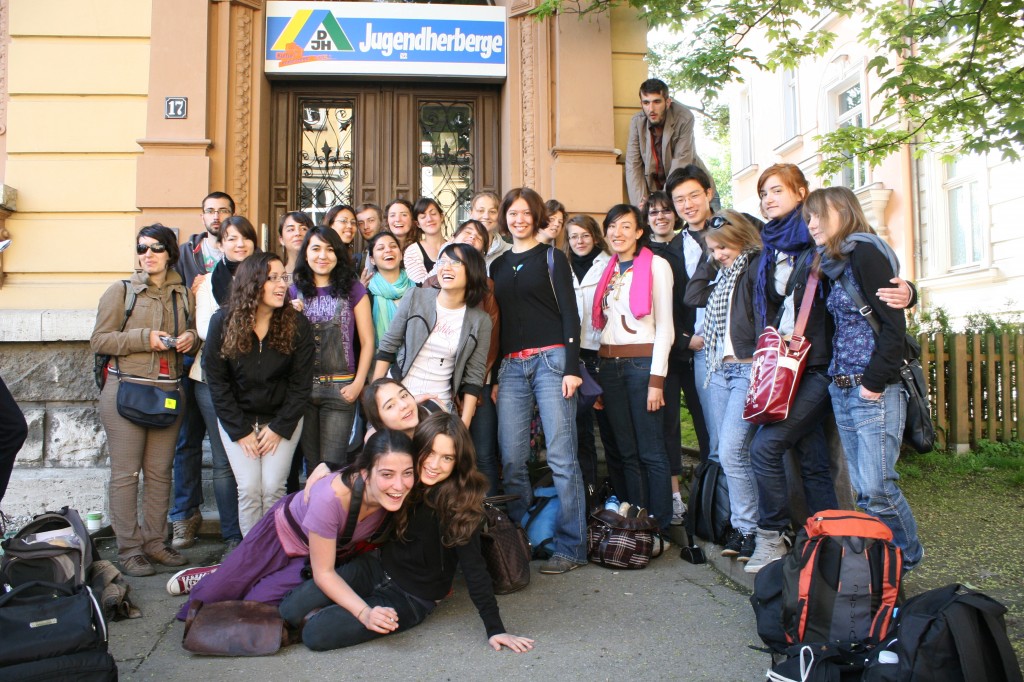Should anybody ask us how the 1st of May in Berlin was, we could not provide any testimony to it, because ECLA journeyed to Weimar for the whole weekend. One more proof that we here are not street fighters, but passionate lovers…of culture! The bright and early start at 7 a.m. might have seemed extreme to a few, but once cosily arranged in the bus, sleep took over the crew faster than you can say “Autobahn”. Unfortunately the regular ‘mastermind’ of the ECLA annual Weimar trip, German language instructor Dirk Deichfuss could not join us, but his presence was felt in the tip-top organization and in the choice of an ‘echte Deutsche Jugendherberge’, where we spent the night. To replace him, residential life coordinator Zoltan Helmich filled the necessary role of jack-of-all-trades, which included everything from tour guide to bus paparazzo.
Opening our eyes to Weimar requested several leaps into the past, to the times of Goethe and Schiller, also earlier, to those of Lucas Cranach, and to the more recent Bauhaus School. Very appreciative of its rich cultural heritage, this town knows how to display it to any bunch of curious tourists like us. Posters announced the celebration of 90 years of Bauhaus, several congresses, and the staging of Romeo and Juliet at the German National Theatre. The sound of hoofs on cobblestone announcing carriages, people in XVIII Century costumes, and meandering narrow streets make this little town appear intrusively surreal. Thank God for the popular celebration in the main square to remind us that there are still wursts and politics in Germany. Especially on the 1st of May!
Some of us could not resist the welcoming cafés; others rushed to the huge Park on the Ilm, while the rest hid away from the sunny day within the walls of museums. I admit being in the last category, but it also includes the German art class who spent their free time in the Bauhaus Museum. Schiller’s house, The Weimar Town museum, Anna Amalia Library, and the Nietzsche Archive were among the places that lured some of us for short visits. We later reunited to fulfil an important tradition for ECLA: the visit to the Goethe National Museum. This is the house which the poet received from Carl August, grand duke of Saxe-Weimar-Eisenach in 1792, and in which he lived after his return from Italy, for almost 50 years, until his death. The building was opened as a memorial building half a century later.
One can’t expect to grasp his genius solely in the many exquisite objects that he collected or received over the years, but the visit is certainly awe-inspiring each time. The museum guide presented the cult-corners of the house such as his library, his study-room and the simple room in which he died, which are accessible to the visitors only from afar. To complement this tour, we headed to Goethe’s first abode in Weimar, his Garden House in the park, and paid tribute to another tradition—playing Frisbee together in the lush surroundings. Just as important, I should not forget to mention the wonderful dinner together and the nocturnal walk to the hostel.
Saturday was ‘wander-full’, as the bus took us outside Weimar and placed us on Goethe’s trekking route – the 28-kilometre “Wanderweg” from Weimar to Großkochberg. It’s not difficult to imagine the natural landscape along the way inspiring Goethe to produce one of the most famous lyric poems in German literature, the Wanderer’s Nightsong. En route we ran into dedicated Goethe “pilgrims” who keep the tradition by walking the entire length through the same meadows and villages that carried the steps of the naturalist through Thuringia. Goethe needed only 4 hours for this trip, but we lingered from one pleasant conversation to another and took plenty of time to admire the scenery, especially at the end of the route, where we climbed up Luisen tower and exchanged smiles with the crowd of summery German wanderers. This part of the Weimar excursion was included for the first time this year; it was such a perfect ending and celebration of Goethe’s spirit, effectively fusing us into a community, that it surely made itself eligible to become another ECLA tradition.
By Brindusa Birhala (PY09, Romania)

